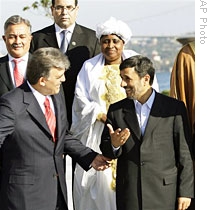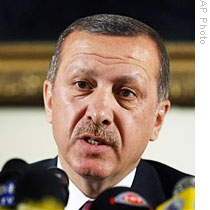Istanbul
12 November 2009
Relations between Turkey and Iran appear to be getting closer and those ties are raising concerns among some of Turkey's Western allies. This past weekend, Turkish President Abdullah Gul said at a meeting in Ankara that his country is keen to bolster relations with neighboring Iran.
Increasing closeness between Turkish leaders and Iran, and Turkey's quest for better ties in the broader Muslim world, have fueled concerns in the West that this key U.S. ally is leaning toward the East.
But Turkey's president used a speech this past weekend at the opening of an Islamic nations' summit in Istanbul to try to ease Western fears.
 |
| Iran's Pres. Mahmoud Ahmedinejad (R),Turkish Pres. Abdullah Gul (L) chat before Organization of Islamic Conference meeting in Istanbul, Turkey, 09 Nov 2009 |
Turkish Prime Minister Recep Tayyip Erdogan displayed what many analysts say is a conciliatory view toward Iran's nuclear program.
"We want to live in a region totally free of nuclear weapons. Not only Iran, but all the countries who have nuclear weapons or developing nuclear armaments should be discussed," he said.
As relations warm between Ankara and Tehran, many in the West fear that Turkey, a modern secular predominantly Muslim state, and a vital bridge between Europe and the Arab world, is turning its back on the West to embrace Islamist regimes to the East - a vast region that extends from the Middle East to the Balkans, the Caucasus and Central Asia.
 |
| Turkish PM Recep Tayyip Erdogan at a press conference at the Turkish Embassy in Tehran, Iran on 28 Oct 2009 |
Turkish newspaper columnist Nuray Mert says the deepening relations are partly due to the similar backgrounds of Turkish Prime Minister Erdogan and Iranian President Mahmoud Ahmadinejad.
"Coming from a conservative religious background, Erdogan may feel more familiar with someone like Ahmadinejad, coming from a humble background - not only being a religious conservative, but also coming from humble background, having popular support. They have similar stories," he said.
Ankara says concerns in the West are overblown. Turkish officials say they merely are strengthening ties between East and West, and that its NATO membership makes Turkey ideally suited to mediate between the two sides.
Turkish journalist Nuray Mert says the real test will come if the international community implements tough sanctions against Iran over its nuclear program. She says that with Ankara's increasingly close ties with Tehran, it is unclear which side Turkey might choose.
"Turkey is intimidating the strategy of the Western world to put pressure on Iran, because we have signed a lot of economic agreements with Iran. It's quite contradictory on the eve of implementing sanctions. But we did not come to the point of giving the last decision about Iran, if Turkey will side with the Western world," he said.
Suat Kiniklioglu, a spokesman for the Turkish parliament's foreign affairs committee, says the country is working behind the scenes to resolve the tensions over Iran's nuclear ambitions.
"We've proposed Turkey facilitating and hosting and the two sides agreed to it. But unfortunately, the Iranian side decided they were not ready at this time to talk to the Americans directly. So I believe it is only matter of time when it will happen, and it most likely it will probably happen in Istanbul," he said.
But Turkey's deepening relations with Tehran coincides with a cooling in ties with its once strategic ally, Israel.
 |
| File photo shows Turkish men waving Palestinian flags in Istanbul at a solidarity night with Palestinians, 07 Feb 2009 |
Even before the violence in Gaza, Prime Minister Erdogan - a strong supporter of the Palestine cause - did not hesitate to describe some of Israel's actions as "state terrorism".
In September, Turkey, which was also hosting indirect peace negotiations between Syria and Israel, canceled its annual joint military maneuvers with the U.S. and Israeli airforces. According to Prime Minister Erdogan, he did "not want Israeli war fighters, which killed innocent civilians in Gaza" to fly over Turkish territory.
Analysts say that could be a topic for discussion next month, when Mr. Erdogan travels to Washington for talks with U.S. President Barack Obama.